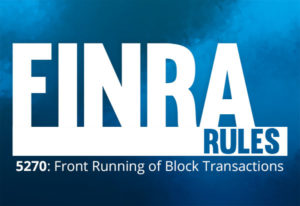FINRA Rule 5270 Overview
 FINRA rule 5270 is one of a series of regulations that helps to ensure that brokers and market makers execute transactions at prices that are in the best interests of their clients.
FINRA rule 5270 is one of a series of regulations that helps to ensure that brokers and market makers execute transactions at prices that are in the best interests of their clients.
More specifically, this rule prohibits the front-running of block transactions. In other words, brokers may not deal in securities-related transactions to benefit themselves if they possess private knowledge that a block transaction is about to take place.
Doing so would be an unlawful form of market manipulation. If you feel as though you have been a victim of market manipulation, you need to contact an experienced securities fraud attorney today.
Rule 5270 Topics Covered Here
What is a Block Transaction?
A block transaction is simply a large trade. FINRA’s rules manual states that a trade involving 10,000 or more shares of a product is considered a ‘block’. Though, in some cases, transactions involving fewer than 10,000 shares may also qualify as a block.
Typically, this would be the case if a large dollar amount was involved in that type of trade. Additionally, back-to-back transactions that have been divided apart to be less than 10,000 shares can also be considered a single block.
What is Front-Running?
As block transactions are very large, they have the potential to move the market price of an underlying security or financial product. Brokers may have access to advanced, non-public, knowledge that a large impactful trade is about to take place. Front-running occurs when a broker uses their non-public knowledge to trade their own personal assets ahead of the block transaction. This highly illegal practice can result in a profit for the front-running broker.
An Example of Front-Running
Imagine that broker receives an order from a client who wants to purchase 100,000 shares of a certain stock. The broker now has inside information that a large purchase that will move the market price is about to occur. A front-running broker could buy some shares of that stock on a personal account ahead of the block trade. Then, the broker could execute the large block trade for their client, which would drive up the price of the stock.
Finally, the broker would sell all of the shares that they just purchased at the higher price, making themselves a profit and bringing the prices of the stock back down. The net-result of this illegal practice would be that the broker would make a small profit while their client would get their stock shares at a worse price.
In essence the broker would be using their inside information to extract some value directly from their own client. FINRA rule 5270 strictly prohibits this type of conduct.
Rule 5270 Applies to More Than Securities
Within the past several years, FINRA has expanded rule 5270 to apply to more than just securities. Currently, this rules also applies to:
- All options;
- Derivatives;
- Securities-based swaps; and
- Other financial products materially related to securities.
Contact Our Office Today
At the Sonn Law Group, we take all investment fraud claims on a contingency basis. That means that our firm will not collect a legal fee unless we help you recover compensation. If you have been the victim of front-running, please do not hesitate to call our office today at 1-844-689-5754 to request a free review of your case.
CONTACT US FOR A FREE CONSULTATION
Se Habla Español
Contact our office today to discuss your case. You can reach us by phone at 844-689-5754 or via e-mail. To send us an e-mail, simply complete and submit the online form below.

